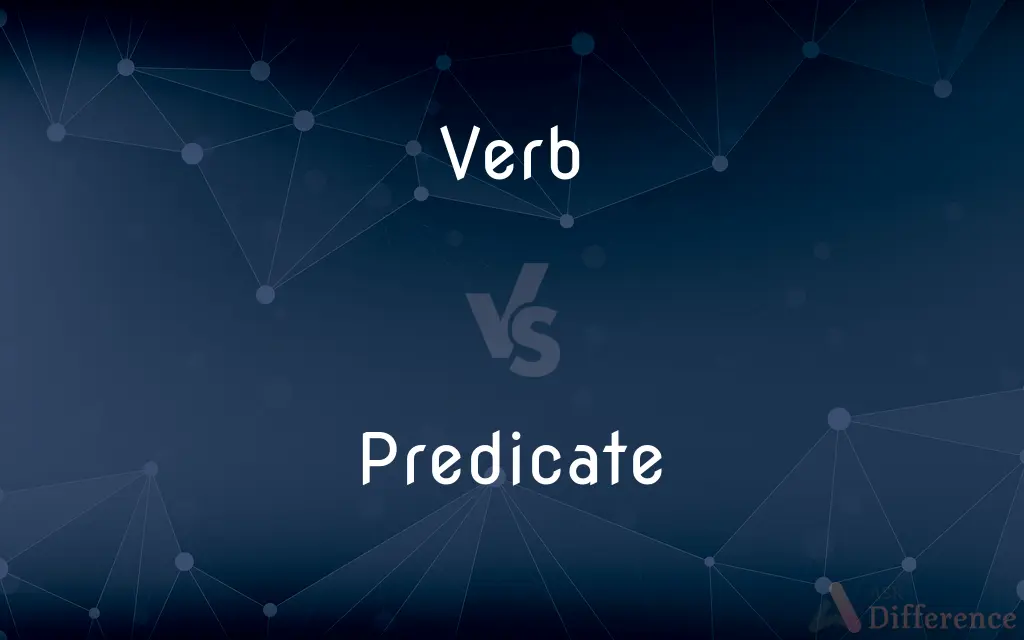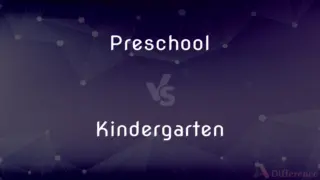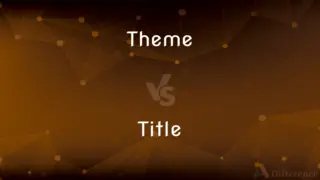Verb vs. Predicate — What's the Difference?
By Tayyaba Rehman — Updated on October 12, 2023
A verb expresses action or state. A predicate contains a verb and tells what the subject does or is.

Difference Between Verb and Predicate
Table of Contents
ADVERTISEMENT
Key Differences
A verb is a fundamental component of any language. It signifies actions, events, or states of being. In contrast, a predicate is a broader concept, encompassing not only the verb but also its accompanying arguments or modifiers.
In the realm of grammar, a verb often stands as the most dynamic part of a sentence. It can denote actions like 'run,' 'eat,' or states like 'be,' 'exist.' On the other hand, the predicate extends the idea presented by the verb. It provides more context, often answering questions like "who?" or "what?" related to the verb.
Considering structure, a verb usually exists as a single word. For instance, in the sentence "She sings," "sings" is the verb. However, in the very same sentence, the predicate is also "sings," because it tells what "She" does. But when we expand the sentence to "She sings beautifully," the predicate becomes "sings beautifully," while "sings" remains the verb.
In essence, while the verb remains the backbone of a sentence, representing core actions or states, the predicate furnishes the sentence with fuller meaning. Both play crucial roles in sentence construction, with the verb as a subset of the predicate.
Comparison Chart
Definition
An action, event, or state word.
Verb plus its complements, objects, or modifiers.
ADVERTISEMENT
Role
Indicates action or state.
Expresses what the subject does or is.
Components
Typically one word.
Contains a verb and possibly other words.
Example
"run" in "She runs."
"runs fast" in "She runs fast."
Grammatical Relation
Core of the predicate.
Provides context and completes a sentence.
Compare with Definitions
Verb
A word that connects the subject to its complement.
The sky looks ominous.
Predicate
The part of the sentence telling what the subject does or is.
Cats are known for their agility.
Verb
A word that expresses an event.
Accidents happen.
Predicate
Comprises the verb and its complements, objects, or modifiers.
He plays the guitar beautifully.
Verb
A word that represents an action.
She dances gracefully.
Predicate
Provides further information about the subject.
The book rests on the table.
Verb
A word that shows existence.
Ghosts exist in folklore.
Predicate
Gives context to the action or state of the subject.
The children ran towards the park gleefully.
Verb
A verb (from Latin verbum 'word') is a word (part of speech) that in syntax conveys an action (bring, read, walk, run, learn), an occurrence (happen, become), or a state of being (be, exist, stand). In the usual description of English, the basic form, with or without the particle to, is the infinitive.
Predicate
To base or establish (a statement or action, for example)
I predicated my argument on the facts.
Verb
A word used to describe an action, state, or occurrence, and forming the main part of the predicate of a sentence, such as hear, become, happen.
Predicate
To state or affirm as an attribute or quality of something
The sermon predicated the perfectibility of humankind.
Verb
Use (a word that is not conventionally used as a verb, typically a noun) as a verb
Any English noun can be verbed, but some are more resistant than others
Predicate
To carry the connotation of; imply.
Verb
The part of speech that expresses existence, action, or occurrence in most languages.
Predicate
(Logic) To make (a term or expression) the predicate of a proposition.
Verb
Any of the words belonging to this part of speech, as be, run, or conceive.
Predicate
To proclaim or assert; declare.
Verb
A phrase or other construction used as a verb.
Predicate
To make a statement or assertion.
Verb
(grammar) A word that indicates an action, event, or state of being.
The word “speak” is an English verb.
Predicate
(Grammar) One of the two main constituents of a sentence or clause, modifying the subject and including the verb, objects, or phrases governed by the verb, as opened the door in Jane opened the door or is very sleepy in The child is very sleepy.
Verb
(obsolete) Any word; a vocable.
Predicate
(Logic) That part of a proposition that is affirmed or denied about the subject. For example, in the proposition We are mortal, mortal is the predicate.
Verb
(figurative) An action as opposed to a trait or thing.
Kindness is a verb, not an adjective. You're only kind if you do kind things.
Predicate
(Grammar) Of or belonging to the predicate of a sentence or clause.
Verb
(programming) A named command that performs a specific operation on an object.
Predicate
Stated or asserted; predicated.
Verb
To use any word that is or was not a verb (especially a noun) as if it were a verb.
Predicate
(grammar) The part of the sentence (or clause) which states a property that a subject has or is characterized by.
Verb
To perform any action that is normally expressed by a verb.
Predicate
(logic) A term of a statement, where the statement may be true or false depending on whether the thing referred to by the values of the statement's variables has the property signified by that (predicative) term.
A propositional variable may be treated as a nullary predicate.
A predicate is either valid, satisfiable, or unsatisfiable.
Verb
A word; a vocable.
Predicate
(computing) An operator or function that returns either true or false.
Verb
A word which affirms or predicates something of some person or thing; a part of speech expressing being, action, or the suffering of action.
Predicate
(grammar) Of or related to the predicate of a sentence or clause.
Verb
A word that serves as the predicate of a sentence
Predicate
Predicated, stated.
Verb
A content word that denotes an action or a state
Predicate
(law) Relating to or being any of a series of criminal acts upon which prosecution for racketeering may be predicated.
Verb
A word that depicts a state of being.
He is a doctor.
Predicate
(transitive) To announce, assert, or proclaim publicly.
Predicate
(transitive) To assume or suppose; to infer.
Predicate
To base (on); to assert on the grounds of.
Predicate
To make a term (or expression) the predicate of a statement.
Predicate
To assert or state as an attribute or quality of something.
Predicate
To assert to belong to something; to affirm (one thing of another); as, to predicate whiteness of snow.
Predicate
To found; to base.
Predicate
To affirm something of another thing; to make an affirmation.
Predicate
That which is affirmed or denied of the subject. In these propositions, "Paper is white," "Ink is not white," whiteness is the predicate affirmed of paper and denied of ink.
Predicate
The word or words in a proposition which express what is affirmed of the subject.
Predicate
Predicated.
Predicate
(logic) what is predicated of the subject of a proposition; the second term in a proposition is predicated of the first term by means of the copula;
`Socrates is a man' predicates manhood of Socrates
Predicate
One of the two main constituents of a sentence; the predicate contains the verb and its complements
Predicate
Make the (grammatical) predicate in a proposition;
The predicate `dog' is predicated of the subject `Fido' in the sentence `Fido is a dog'
Predicate
Affirm or declare as an attribute or quality of;
The speech predicated the fitness of the candidate to be President
Predicate
Involve as a necessary condition of consequence; as in logic;
Solving the problem is predicated on understanding it well
Predicate
Contains the main verb of the clause.
The sun shines brightly.
Common Curiosities
Is the predicate always longer than the verb?
Not necessarily. In "She sings," both the verb and predicate are "sings."
Can a verb exist without a predicate?
No, every verb is part of a predicate.
Are all words in the predicate verbs?
No, a predicate contains a verb but can also include objects, complements, and modifiers.
Can a sentence have multiple verbs?
Yes, especially in compound or complex sentences.
What's the role of a verb in a sentence?
A verb indicates the action, state, or event happening in the sentence.
In "She reads books," what is the predicate?
The predicate is "reads books."
What is a verb?
A verb denotes action, event, or state in a sentence.
Can a sentence have multiple predicates?
Yes, in compound sentences where subjects perform more than one action.
What is a predicate?
A predicate tells what the subject does or is and includes the verb and its accompanying words.
Can "swimming" be a verb?
Yes, "swimming" can be a gerund, which functions like a noun, or part of a continuous tense verb form.
What's the role of a predicate in a sentence?
A predicate gives context and complete meaning to the subject's action or state.
Is "am" a verb?
Yes, "am" is a form of the verb "be," indicating a state of being.
Does a predicate always need a direct object?
No, not all predicates require a direct object.
Are modifiers part of the predicate?
Yes, modifiers that provide additional information about the verb's action are part of the predicate.
What is a linking verb?
A linking verb connects the subject to its complement or description, like "is" or "seems."
Share Your Discovery

Previous Comparison
Preschool vs. Kindergarten
Next Comparison
Theme vs. TitleAuthor Spotlight
Written by
Tayyaba RehmanTayyaba Rehman is a distinguished writer, currently serving as a primary contributor to askdifference.com. As a researcher in semantics and etymology, Tayyaba's passion for the complexity of languages and their distinctions has found a perfect home on the platform. Tayyaba delves into the intricacies of language, distinguishing between commonly confused words and phrases, thereby providing clarity for readers worldwide.














































